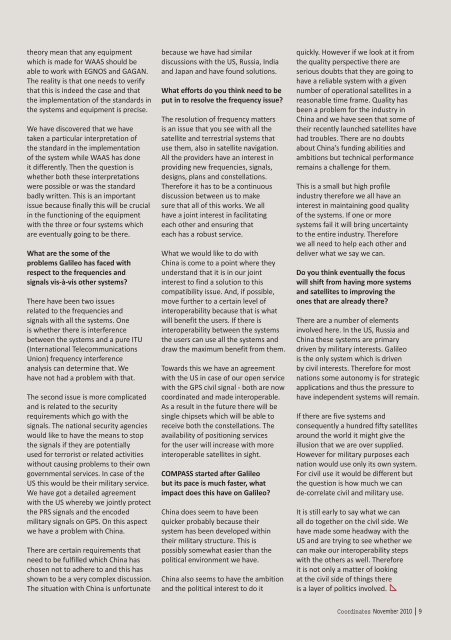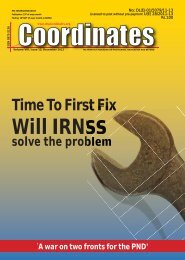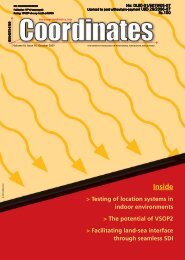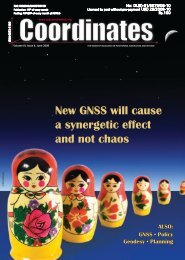Co-ordinates
Co-ordinates
Co-ordinates
Create successful ePaper yourself
Turn your PDF publications into a flip-book with our unique Google optimized e-Paper software.
theory mean that any equipment<br />
which is made for WAAS should be<br />
able to work with EGNOS and GAGAN.<br />
The reality is that one needs to verify<br />
that this is indeed the case and that<br />
the implementation of the standards in<br />
the systems and equipment is precise.<br />
We have discovered that we have<br />
taken a particular interpretation of<br />
the standard in the implementation<br />
of the system while WAAS has done<br />
it differently. Then the question is<br />
whether both these interpretations<br />
were possible or was the standard<br />
badly written. This is an important<br />
issue because finally this will be crucial<br />
in the functioning of the equipment<br />
with the three or four systems which<br />
are eventually going to be there.<br />
What are the some of the<br />
problems Galileo has faced with<br />
respect to the frequencies and<br />
signals vis-à-vis other systems?<br />
There have been two issues<br />
related to the frequencies and<br />
signals with all the systems. One<br />
is whether there is interference<br />
between the systems and a pure ITU<br />
(International Telecommunications<br />
Union) frequency interference<br />
analysis can determine that. We<br />
have not had a problem with that.<br />
The second issue is more complicated<br />
and is related to the security<br />
requirements which go with the<br />
signals. The national security agencies<br />
would like to have the means to stop<br />
the signals if they are potentially<br />
used for terrorist or related activities<br />
without causing problems to their own<br />
governmental services. In case of the<br />
US this would be their military service.<br />
We have got a detailed agreement<br />
with the US whereby we jointly protect<br />
the PRS signals and the encoded<br />
military signals on GPS. On this aspect<br />
we have a problem with China.<br />
There are certain requirements that<br />
need to be fulfilled which China has<br />
chosen not to adhere to and this has<br />
shown to be a very complex discussion.<br />
The situation with China is unfortunate<br />
because we have had similar<br />
discussions with the US, Russia, India<br />
and Japan and have found solutions.<br />
What efforts do you think need to be<br />
put in to resolve the frequency issue?<br />
The resolution of frequency matters<br />
is an issue that you see with all the<br />
satellite and terrestrial systems that<br />
use them, also in satellite navigation.<br />
All the providers have an interest in<br />
providing new frequencies, signals,<br />
designs, plans and constellations.<br />
Therefore it has to be a continuous<br />
discussion between us to make<br />
sure that all of this works. We all<br />
have a joint interest in facilitating<br />
each other and ensuring that<br />
each has a robust service.<br />
What we would like to do with<br />
China is come to a point where they<br />
understand that it is in our joint<br />
interest to find a solution to this<br />
compatibility issue. And, if possible,<br />
move further to a certain level of<br />
interoperability because that is what<br />
will benefit the users. If there is<br />
interoperability between the systems<br />
the users can use all the systems and<br />
draw the maximum benefit from them.<br />
Towards this we have an agreement<br />
with the US in case of our open service<br />
with the GPS civil signal - both are now<br />
coordinated and made interoperable.<br />
As a result in the future there will be<br />
single chipsets which will be able to<br />
receive both the constellations. The<br />
availability of positioning services<br />
for the user will increase with more<br />
interoperable satellites in sight.<br />
COMPASS started after Galileo<br />
but its pace is much faster, what<br />
impact does this have on Galileo?<br />
China does seem to have been<br />
quicker probably because their<br />
system has been developed within<br />
their military structure. This is<br />
possibly somewhat easier than the<br />
political environment we have.<br />
China also seems to have the ambition<br />
and the political interest to do it<br />
quickly. However if we look at it from<br />
the quality perspective there are<br />
serious doubts that they are going to<br />
have a reliable system with a given<br />
number of operational satellites in a<br />
reasonable time frame. Quality has<br />
been a problem for the industry in<br />
China and we have seen that some of<br />
their recently launched satellites have<br />
had troubles. There are no doubts<br />
about China’s funding abilities and<br />
ambitions but technical performance<br />
remains a challenge for them.<br />
This is a small but high profile<br />
industry therefore we all have an<br />
interest in maintaining good quality<br />
of the systems. If one or more<br />
systems fail it will bring uncertainty<br />
to the entire industry. Therefore<br />
we all need to help each other and<br />
deliver what we say we can.<br />
Do you think eventually the focus<br />
will shift from having more systems<br />
and satellites to improving the<br />
ones that are already there?<br />
There are a number of elements<br />
involved here. In the US, Russia and<br />
China these systems are primary<br />
driven by military interests. Galileo<br />
is the only system which is driven<br />
by civil interests. Therefore for most<br />
nations some autonomy is for strategic<br />
applications and thus the pressure to<br />
have independent systems will remain.<br />
If there are five systems and<br />
consequently a hundred fifty satellites<br />
around the world it might give the<br />
illusion that we are over supplied.<br />
However for military purposes each<br />
nation would use only its own system.<br />
For civil use it would be different but<br />
the question is how much we can<br />
de-correlate civil and military use.<br />
It is still early to say what we can<br />
all do together on the civil side. We<br />
have made some headway with the<br />
US and are trying to see whether we<br />
can make our interoperability steps<br />
with the others as well. Therefore<br />
it is not only a matter of looking<br />
at the civil side of things there<br />
is a layer of politics involved.<br />
<strong>Co</strong><strong>ordinates</strong> November 2010 | 9
















